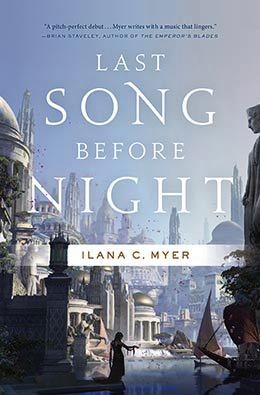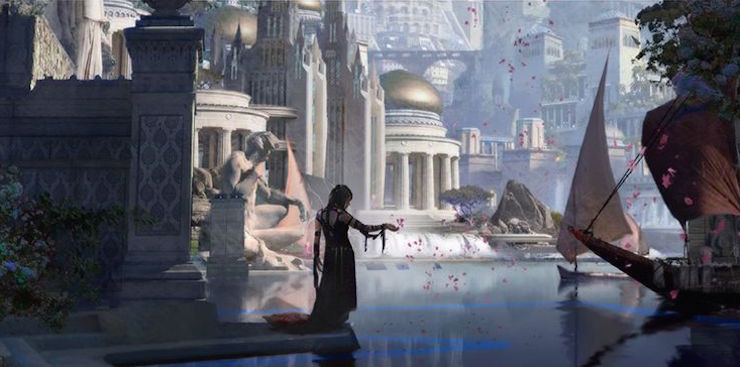An interesting perk of being published is that you get requests to do blurbs for upcoming books. The catch is, you’re usually asked because the new book in some way resembles what you’ve written. The two dangers of this are (a) this book is so much worse than mine, I’ll lose all credibility if I say something good, or (b) this is so good I may never write again.
When I was asked to blurb Ilana Myer’s Last Song Before Night, it was clear why: it’s a fantasy that revolves around music, just as my Tufa novels do. It’s been done before (most influentially in Emma Bulls War for the Oaks, which invented urban fantasy), but it’s still a fairly unexploited subgenre compared to, say, dragons or vampires.
When I started reading Last Song, though, I quickly grasped that this was actually nothing like my work. It’s a piece of startlingly original literature, heartfelt and courageous.
It’s a story of adults facing challenges with maturity and a sense of decency, not Chosen Ones going on another trite Hero’s Journey. And lastly, it’s a story of musicians that takes into account the effort it takes to be good at it, and the effect (and responsibility) that comes with being good. The fact that it reads like a shot is gravy on the biscuit (and if you knew how much I love biscuits, you’d know what a compliment that is).
To begin with, take the title. This is a high fantasy novel, with a secondary-world setting filled with fictional societies, religions, and cultures. The characters have names that, if not quite as bad as Lovecraft, are not ones you’d encounter on your kid’s class list. Based on those, it could have easily been titled The Fall of Tamryllin or The Curse of Nickon Gerrard or The Secret of Kimbralin Amaristoth or even Live from Eivar! (my favorite).
 But instead, it’s called Last Song Before Night, a title which evokes both an end and a beginning, a reference to both the actual events of the story, and its themes. It doesn’t tell you anything about which of the characters you meet in the opening chapters will turn out to be the protagonist(s). It doesn’t give you any sense of what sort of fantasy you might be heading into (and when I read the ARC, it had a simple green paper cover, so there was really nothing to give the title context).
But instead, it’s called Last Song Before Night, a title which evokes both an end and a beginning, a reference to both the actual events of the story, and its themes. It doesn’t tell you anything about which of the characters you meet in the opening chapters will turn out to be the protagonist(s). It doesn’t give you any sense of what sort of fantasy you might be heading into (and when I read the ARC, it had a simple green paper cover, so there was really nothing to give the title context).
And that’s because Myer may use the tropes of high fantasy for her setting, but her interpersonal dynamics all speak of direct contemporary issues: misogyny, social inequality, post-traumatic stress, the influence of religion, and the necessity of helping others. This isn’t an uncommon thing in fantasy, but it’s seldom integrated as seamlessly as it is here. Her fictional societies are made up of all the elements we see at work in the world around us, and as a result, there’s an immediacy and urgency to the story that those other, more typical and distancing titles wouldn’t capture.
And then there’s the plot itself. I won’t give away much, but I will say the poet/musicians of her story gather for a great contest, and the rest of the story spirals out from this event. There is backstage gossiping about the judging, and the crowd’s response is noted. And this may be my favorite thing about this book. Not many authors could set up a meaningful epic fantasy beginning with a version of American Idol, but Myer does. We may be in a strange place, with strange people, watching strange events, but the emotions are all contemporary.
There are other things that, whether deliberate or not, powerfully echo elements from this world. In my Tufa novels, music is the embodiment of magic, a way of hiding enchantments in plain sight. In Last Song, music is even more magical: it has the very real potential to bring about political and social change. This power is embodied by Valanir Ocune, a sort of Woody Guthrie figure who wanders about singing songs that inspire the downtrodden and frighten the powers-that-be (it wouldn’t be out of place for Ocune’s harp to have “This device kills evil wizards” painted on it, much like Guthrie’s guitar declared, “This machine kills Fascists”).
All of this is my interpretation, of course. I don’t know that Myer had any of these idea in mind, and it really doesn’t matter. The power of a work of art often exists independent of the artist’s concerns. But when I read it, I was drawn not to the setting, not to the magical techniques or elaborate currency or inventive social rules, but to the people. When I write, my world-building is secondary; I’m much more concerned with people-building, and then putting them in a world that helps tell their stories. I get the sense that Myer feels the same way.
On her blog, Myer recently declared that she’s finished the sequel, and promises, “I was determined not to do the same thing, or even a similar thing, again.” And based on Last Song Before Night, I can’t wait to see what she comes up with. Because whatever it is, I’m willing to bet it will be, above all, a story of real people experiencing relatable emotions against a background where the names may be different, but the roles are ones we’ll all recognize. As a result, we’ll be more than mere readers; we’ll be like those folks clustered around a campfire listening to an expert bard cast her spell.
 Alex Bledsoe grew up in west Tennessee an hour north of Graceland (home of Elvis) and twenty minutes from Nutbush (birthplace of Tina Turner). He’s been a reporter, editor, photographer and door-to-door vacuum cleaner salesman. His latest novel is Chapel of Ease, available from Tor Books.
Alex Bledsoe grew up in west Tennessee an hour north of Graceland (home of Elvis) and twenty minutes from Nutbush (birthplace of Tina Turner). He’s been a reporter, editor, photographer and door-to-door vacuum cleaner salesman. His latest novel is Chapel of Ease, available from Tor Books.










